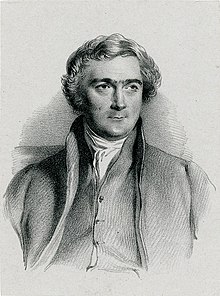Joseph John Gurney
Joseph John Gurney | |
|---|---|
 | |
| Born | August 2, 1788 |
| Died | 4 January 1847 (aged 58) |
| Spouse | |
Joseph John Gurney (2 August 1788 – 4 January 1847) was a banker in Norwich, England and a member of the Gurney family of that city. He became an evangelical minister of the Religious Society of Friends (Quakers), whose views and actions led, ultimately, to a schism among American Quakers.
Biography
[edit]Gurney was born at Earlham Hall near Norwich (now part of the University of East Anglia), the tenth child of John Gurney (1749–1809) of Gurney's Bank. He was always called Joseph John. He was the brother of Samuel Gurney, Elizabeth Fry (née Gurney), a prison and social reformer, and Louisa Hoare (née Gurney), a writer on education, and also the brother-in-law – through his sister the campaigner Hannah Buxton – of Thomas Fowell Buxton, who was also an anti-slavery campaigner.[1]
In September 1837 Gurney met Eliza Paul Kirkbride while returning from England.[2][3] The two worked together during his trips to the United States, and Kirkbride joined Gurney in preaching in favor of prison reform, pacifism, and the abolition of slavery.[2] Gurney married Kirkbride in October 1841.[2]
Gurney also advocated total abstinence from alcohol. He wrote a tract on the subject called Water Is Best.[4]

As a boy George Borrow used to fish the River Yare near Earlham Hall and on one occasion was caught by Joseph John Gurney. Gurney later invited the boy into the hall to see his books.[5] In his semi-autobiographical novel Lavengro, Borrow recalls the hall with great precision: "On the right side is a green level, a smiling meadow, grass of the richest decks the side of the slope; mighty trees also adorn it, giant elms, the nearest of which, when the sun is nigh its meridian, fling a broad shadow upon the face of the ancient brick of an old English Hall. It has a stately look, that old building, indistinctly seen, as it is, among the umbrageous trees."[5]
Works
[edit]Joseph John Gurney had written over 80 letters and works, of which include:[6]
- Notes on a visit made to some of the prisons in Scotland and the North of England in company with Elizabeth Fry; with some general observations on the subject of prison discipline (1819)
- Observations on the religious peculiarities of the Religious Society of Friends (1824)
- Essays on the Evidences, Doctrines and Practical Operations of Christianity (1825)
- Brief remarks on the History, Authority and Use of the Sabbath, (1831)
- A Winter in the West Indies (1840)
- Religion and the New Testament (1843)
- Gurney, Joseph John (1854). Braithwaite, Joseph Bevan (ed.). Memoirs of Joseph John Gurney. With Selections from his Journal and Correspondence. Philadelphia: Lippincott, Grambo & Co. in 2 volumes: vol. 1, vol. 2[7]
See also
[edit]- Gurney family (Norwich) – Influential English Quakers in Norwich
- Gurney's bank – Bank formerly based in Norwich, England
References
[edit]- ^ Clare Midgley, ‘Buxton , Priscilla (1808–1852)’, Oxford Dictionary of National Biography, Oxford University Press, 2004; online edn, Sept 2015 accessed 26 June 2017
- ^ a b c "About West Hill". www.westhillnj.org. Retrieved 2 September 2023.
- ^ "Gurney, Eliza Paul Kirkbride". House Divided. Retrieved 2 September 2023.
- ^ "Gurney, Joseph John".
- ^ a b Earlham Hall on www.literarynorfolk.co.uk, access date 13 Sept 2012.
- ^ "Online Books by Joseph John Gurney". University of Pennsylvania Library. Retrieved 31 July 2024.
- ^ Review of Gurney (1854): "Memoirs of J.J. Gurney". The Gentleman's Magazine. 42: 134–139. 1854.
External links
[edit]- Claus Bernet (2008). "Joseph John Gurney". In Bautz, Traugott (ed.). Biographisch-Bibliographisches Kirchenlexikon (BBKL) (in German). Vol. 29. Nordhausen: Bautz. cols. 515–526. ISBN 978-3-88309-452-6.
- Biography of Joseph John Gurney
- Sermons by Gurney and his followers from the Quaker Homiletics Online Anthology
- Verily Anderson, family biographer
- Milligan, Edward H. "Gurney, Joseph John (1788–1847)". Oxford Dictionary of National Biography (online ed.). Oxford University Press. doi:10.1093/ref:odnb/11771. (Subscription or UK public library membership required.). The first edition of this text is available at Wikisource: . Dictionary of National Biography. London: Smith, Elder & Co. 1885–1900.
